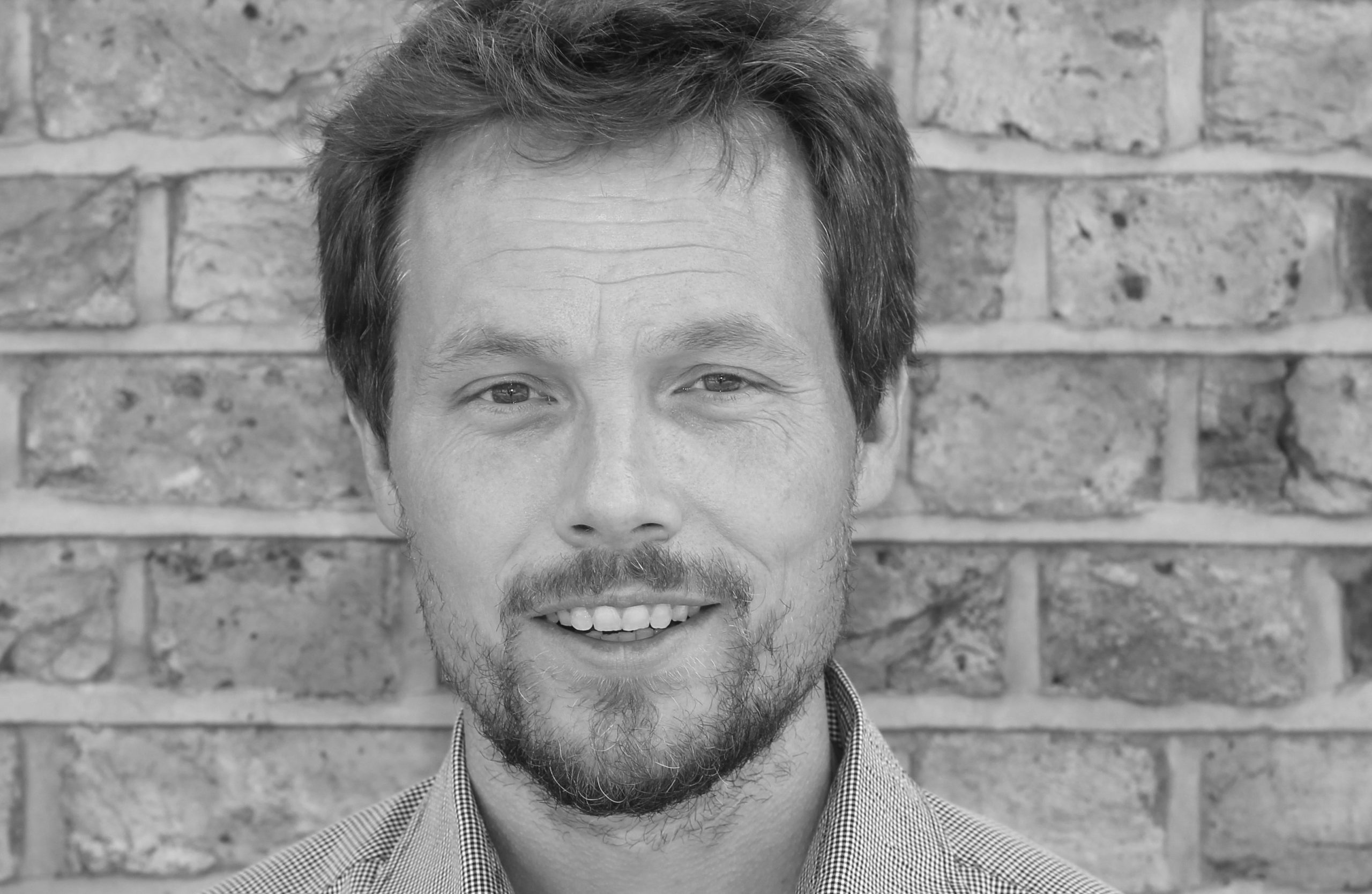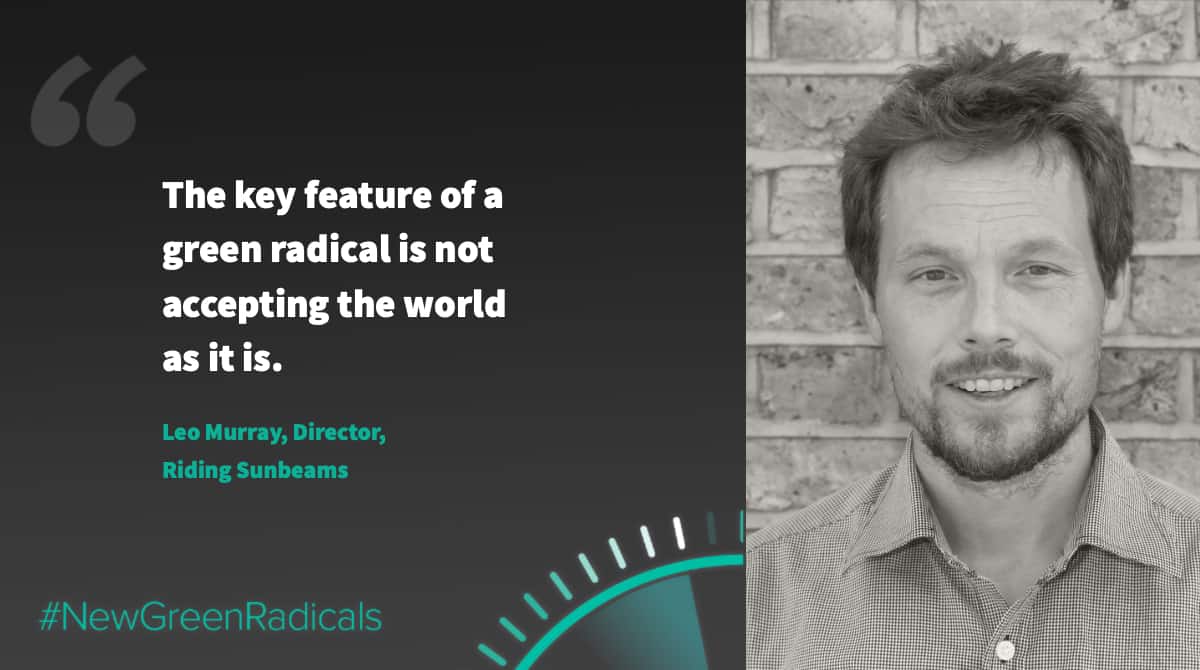New Green Radicals: Leo Murray
Leo Murray is the director of Riding Sunbeams, a social enterprise which connects solar panels directly to rail routes in the UK to help power trains and cut emissions.
The project is jointly owned by Community Energy South alongside climate charity Possible (formerly 10:10), which Leo co-founded in 2009 and today works for as director of innovation.

Do you think it’s important we respond to the climate emergency?
Absolutely. It’s not just a moral imperative – we’re living through it.
Why do you think we need green radicals at a time like this?
The business-as-usual scenarios are the baseline for what we would expect if we keep on our current trajectory, and in those scenarios, we all die. That’s not an overstatement. Business-as-usual will give us seven or eight degrees of warming, and whole regions of Earth become uninhabitable to human life in that scenario, so there is evidently a need to do business differently.
How would you define a green radical?
The key feature of a green radical is not accepting the world as it is, and instead being able to imagine things working differently, and to shape the world according to how it should be.
Do we need to redefine how markets operate?
We do. We are now so late in responding to the climate and ecological crisis that it’s really incumbent on the advocates of capitalism to prove it is capable of doing what needs to be done to tackle it, because you’re increasingly seeing younger people doubting it due to the evidence in front of their eyes.
That’s not to say capitalism is irredeemable – but at the moment global emissions are still rising. What I’d like to see is responsible businesses disavowing the free market dogma that has dominated political discourse on the economy. What we’re facing now is an impending crisis that small tweaks – market- based measures, incentives and penalties – can’t solve alone. We’re at such a late stage now, that if you want to do things through markets you’re still going to need some very heavy-handed market intervention.
What’s the biggest barrier to change?
The UK’s net zero target indicates huge changes will have to take place across all sectors of the economy, but we don’t have the policy framework to meet the target. Much of the problem is political. British businesses are very good at innovating and coming up with solutions. There must be so many brilliant ideas for businesses that would be viable in a scenario where everybody was forced to account for their externalities. If you did have an economy-wide carbon price, you would have a whole load of things which at the moment don’t work because the numbers don’t stack up today, suddenly making sense.

How have customers, stakeholders and employees responded?
People absolutely love it. It’s pretty amazing how far we’ve got in the partnership with Network Rail, and they’re very candid that they wouldn’t have done it on their own. I haven’t yet met anyone who hasn’t gone “oh wow – that’s brilliant, I love it”. It’s an easy sell.
How do you inspire others towards green radicalism?
Firstly people have to understand how serious the problem is. So if people have grasped how much danger they’re in, then they are already primed and predisposed to looking at solutions. But that is not enough on its own – you have to have something that is appealing, positive, and invites people into it. If you’ve got a solution that is appealing, now is the time to be pitching it.
What area of the economy do you think is most in need of radical change?
Transport is the sector of the UK economy where emissions haven’t fallen appreciably; in fact road transport emissions went up last year, and aviation emissions go up almost every year.
Aviation is a particular problem because there are no technological solutions that are capable of making a major contribution to emissions reduction within the necessary timeframe. So we’re going to need to see the air travel sector shrink – and that is not a welcome message if you work in that sector – but it is very clear that is the only thing that will work.
We need a profound and fundamental rethink of mobility and how we get around. It won’t be easy, but we know what the solutions are, and cities are a very obvious place to start.
What’s the secret to taking a radical idea into the mainstream?
People are deeply irrational and fundamentally sociable, so if you can get something which captures the public imagination that people with social influence are drawn to then it will fly… even if it’s a bad idea.
What’s the most radical thing you’ve ever done?
I chained myself to the runway which shut down Stansted Airport for about eight hours in 2008.
Who are the green radicals that inspire you today?
There’s loads. The school strikers, obviously. Almost every day I think about them and it is galvanising me to crack on with my work. They have such moral clarity – and it’s not just Greta, you can listen to any one of them – so you can’t dispute anything they’re saying, and
it makes us all look bad, even those of us who have been working on this for years. I find them genuinely inspiring.
But in the business world, Mark Constantine, who founded Lush. Their business practice itself is great, in terms of sustainability and their supply chain. But more than that, Lush has for many years played an important role in supporting grassroots civil society action on climate change and other social issues. That budget has come from Lush’s charity pot. The money doesn’t come with any strings attached, and people don’t often know because the company doesn’t trumpet it.
This interview forms part of a series of interviews that were published in a new report, New Green Radicals: The business leaders responding to the climate emergency. The report follows last year’s ‘Meet the Disruptors’ and 2017’s ‘Secrets of the Pioneers’ reports, and this year features interviews with entrepreneurs, leaders and creators who are providing radical solutions to the climate crisis.
The report is produced by Greenhouse PR in association with BusinessGreen and was launched at the BusinessGreen Leaders’ Summit on October 23rd. Follow live on social media with #NewGreenRadicals.
At Greenhouse, we support a wide variety of organisations pioneering climate action. Whether it’s fashion, finance or farming, if you’ve got a great story and need our help to tell it, get in touch with the Greenhouse team on 0117 214 1250 or email info@greenhousepr.co.uk.


